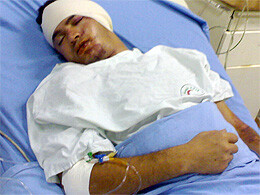The Electronic Intifada 7 October 2008

Haithem, a 21-year-old student, said he was attacked by a group of Israeli security forces on 21 August. (IRIN)
According to estimates by residents, some 5,000 olive trees sit on 270 hectares between the path of the wall and the border of the West Bank with Israel, known as the Green Line.
“People depend on this land, especially because they have already lost so much,” said Hindi Misleh, an activist in the village.
The village, Misleh said, lost over 4,000 hectares of land to Israel in the 1948 war and then another 800 to Israeli settlements which started to pop up around Nilin in the 1980s.
“Every year the settlers took more land,” he said.
Permits
In the past Nilin residents did not have a problem accessing the land they still maintained control over. However, this year, residents said they are being told Israeli-issued permits will be required.
“Last year, we had access without permits, and now they say we need permits, but they won’t give them to us,” said Bahjat, a resident whose family has some 20 hectares on the “wrong” side of the wall.
“I don’t even like these permits. I want to be able to harvest my olives freely, without having to ask for permission,” he said. “The land is mine, not Israel’s.”
Abdullah, a student, said he witnessed what permits do to the community: “Some people get permits and then some people don’t,” the young man said. “This is not good for the social fabric in a village.”
The mayor of the town of 5,000 was informed that no permits would be issued, ostensibly because of the land’s close proximity to the nearby settlements.
“But we were here first. We didn’t move closer to them, they moved closer to us,” an exasperated Bahjat said.
The Israeli military said in a statement issued on 5 October that it had given 3,000 permits to farmers in the West Bank to access land between the wall and the Green Line. The security forces “will continue to strive in order to create conditions for the Palestinian population to lead normal daily lives, while continuing to fight terrorism and ensuring the security of the citizens of Israel,” the statement read.
When Israel began to build the wall several years ago, its route did not follow the Green Line. Instead, the wall cut into West Bank territory.
Protests
In 2004 Nilin protested against the original route of the wall on one side of the village and succeeded in having it moved so that it would take up less land. However, in May 2008 the bulldozers returned to the other side of the village, where the route extends deep into the West Bank, dividing them from their land.
The villagers started fierce protests. “The goal was to stop the construction of the wall,” said Hindi the activist. So far, the protests have delayed work by months.
However, Nilin has also paid a price. Two children, aged 10 and 17, have been killed by Israeli soldiers since May. Several others have suffered serious injuries, such as losing an eye, according to local residents.
Haithem, a 21-year-old student, said he was attacked by a group of Israeli security forces on 21 August, the same day as a small protest near the wall, which he did not attend. He had not been to the village for two months and had come home to give money to his parents.
“Without asking any questions, the soldiers beat me, just started hitting and kicking me with their boots,” he said, smiling sheepishly, revealing missing teeth. He says he lost three in the incident.
Palestinian women in the village saw the event unfold and ran to help, separating the soldiers from the man on the ground, who was covered in blood. He staggered up and tried to run away when the soldiers shot a rubber-coated bullet at the back of his head. “They tell me the soldiers thought I was dead,” he said.
The incident was not officially reported and independent confirmation impossible. However, Haithem’s story was backed up by several other people interviewed by IRIN, including a local health worker.
This item comes to you via IRIN, a UN humanitarian news and information service, but may not necessarily reflect the views of the United Nations or its agencies. All IRIN material may be reposted or reprinted free-of-charge; refer to the copyright page for conditions of use. IRIN is a project of the UN Office for the Coordination of Humanitarian Affairs.
Related Links
- Nilin village continues to resist Israeli siege, Jonathan Cook (2 September 2008)
- Israel pushes ahead with settlement expansion, Mel Frykberg (27 August 2008)
- Rights group: Deaths of two Nilin boys “willfull killing”, Al-Haq (7 August 2008)
- An open letter: Father to father, Bassam Aramin (7 August 2008)
- Israeli forces mortally wound Nilin teenager after funeral, Flashpoints (1 August 2008)
- Transcript: Israeli military kills 10-year-old in Nilin, Flashpoints (30 July 2008)

